This post has already been read 5776 times!
The World Bank Group on Thursday said it has discontinued the publishing of its Doing Business report after 18 years – the first edition was published in 2003.
The doing business index measured regulations directly affecting the ease of doing businesses in 190 countries.
World Bank said it reached the decision to discontinue the report after “internal reports raised ethical matters, including the conduct of former Board officials as well as current and/or former Bank staff.”
Devex reported on Thursday that an independent investigation document found that Kristalina Georgieva, who served as the bank’s chief executive officer from 2017 to 2019 and is now the managing director of the International Monetary Fund, applied “pressure” to have China ranked more favourably.
Georgieva, however, disagreed with the findings.
“I disagree fundamentally with the findings and interpretations of the Investigation of Data Irregularities as it relates to my role in the World Bank’s Doing Business report of 2018,” she said in a statement.
The global lender noted that “trust in the research of the World Bank Group is vital” in continuing the issuance of the report.
“After reviewing all the information available to date on Doing Business, including the findings of past reviews, audits, and the report the Bank released today on behalf of the Board of Executive Directors, World Bank Group management has taken the decision to discontinue the Doing Business report,” World Bank Group said in a statement.
The World Bank Group, however, said it remains firmly committed to advancing the role of the private sector in development and providing support to governments to design the regulatory environment that supports this.
World Bank Group said it is aware that the research informs the actions of policymakers, helps countries make better-informed decisions, and allows countries and private stakeholders – civil society, academia, journalists, and others to measure economic and social improvements more accurately.
However, the bank said it discovered some “data irregularities on Doing Business 2018 and 2020 were reported internally in June 2020, World Bank management paused the next Doing Business report and initiated a series of reviews and audits of the report and its methodology.”
Going forward, the World Bank Group said it will be working on a new approach to assessing the business and investment climate.
The ease of doing business index was, above all, a benchmark study of regulation in 190 countries. The survey consisted of a questionnaire designed by the Doing Business team with the assistance of academic advisers. The questionnaire centered on a simple business case that ensures comparability across economies and over time.
How World Bank ranked countries Ease of Doing Business index:
A nation’s ranking on the index was based on an average of 10 subindices according to the World Bank. These are:
Starting a business – Procedures, time, cost, and minimum capital to open a new business.
Dealing with construction permits – Procedures, time, and cost to build a warehouse.
Getting electricity – procedures, time, and cost required for a business to obtain a permanent electricity connection for a newly constructed warehouse.
Registering property – Procedures, time, and cost to register commercial real estate.
Getting credit – Strength of legal rights index, depth of credit information index.
Protecting investors – Indices on the extent of disclosure, the extent of director liability, and ease of shareholder suits.
Paying taxes – Number of taxes paid, hours per year spent preparing tax returns, and total tax payable as a share of gross profit.
Trading across borders – Number of documents, cost, and time necessary to export and import.
Enforcing contracts – Procedures, time, and cost to enforce a debt contract.
Resolving insolvency – The time, cost, and recovery rate (%) under a bankruptcy proceeding.
As the Ease of Doing Business wraps up, the World Bank Group said it is “deeply grateful” to everyone that worked diligently to advance the business climate agenda” and it looks “forward to harnessing their energies and abilities in new ways.”
The report is influential in many countries.
In Nigeria, the ease of doing business is one of the yardsticks the government uses to measure the impact of its policies on businesses especially Micro, Small and Medium Enterprises (MSMEs).
Nigeria was ranked 131 on the 2020 Ease of Doing Business ranking with a general score of 56.9. The highest scores were obtained in the fields of starting a business, dealing with construction permits, and getting credits.
On the other hand, Nigeria’s performance in other fields was low, for instance in registering properties, trading across borders, and resolving insolvencies.
The Nigerian government in April 2021 said small businesses represent at least 50% of the country’s GDP and 80% of its current employment rate. The government had said its economic policies were aimed at helping it improve on the Ease of Doing Business index.



